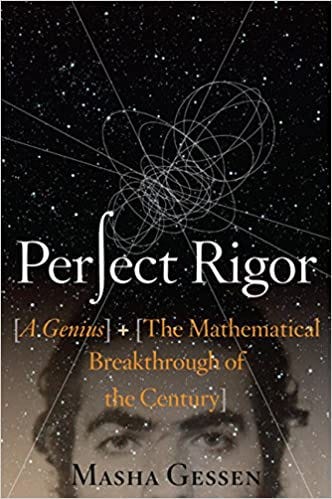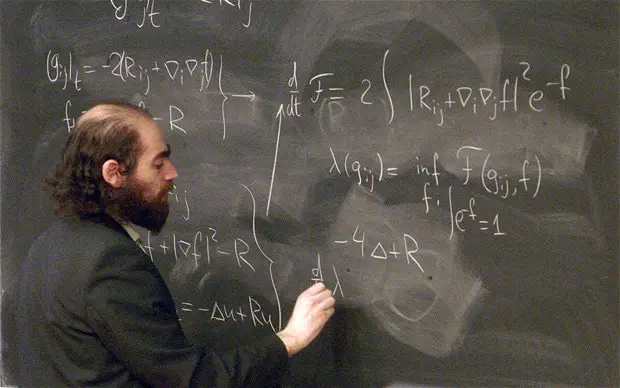 rigori Perelman may not be such a familiar name, however, in 2006 it became very popular at an international level. Perelman is a Russian mathematician who is simply in love with the subject. He started showing it at only 10 years of age when he was able to solve advanced equations at a post-graduate level.
rigori Perelman may not be such a familiar name, however, in 2006 it became very popular at an international level. Perelman is a Russian mathematician who is simply in love with the subject. He started showing it at only 10 years of age when he was able to solve advanced equations at a post-graduate level.
Born and raised in Saint Petersburg, Russia, Perelman came from neither a rich background nor a very intellectual one as both of his parents were factory workers. Since the age of 10, Perelman attended a math afterschool club. His math teacher named Sergei Rukshin was a 19-year-old prodigy who at the time was his idol.
Rukshin managed to inspire Perelman to use his mathematical abilities to “pursue the impossible.” Perelman wasn’t just very good at maths, he was an absolute genius that was able to solve complex math problems in his head without writing any calculations down.
Passion becoming a way of life
As time went by he got his Doctorate in Mathematics. He was so obsessed with his passion for mathematics that he started living his way by this passion. He would calculate everything he would do, even calculating the value of his friendships and other social behaviors. Everything in his life had to be organized in a logical manner.
In 1994, Perelman went to the United States to discuss maths with other brilliant mathematics. Whilst he was there he managed to solve the Soul theorem, a very complex mathematical problem from 1972 created by Gromoll and Cheeger who no one was able to solve in decades.
Perelman solved the problem by only taking four pages of calculations whilst other mathematicians in previous years wrote books worth of calculations in trying to solve this problem. This brought him a lot of fame within the United States. He was even offered a job as a lecturer at both Stanford and Princeton universities which he refused.
In 1995, he returned to Russia and discontinued any communication with the international mathematics community. They wanted fame and admiration for their work, something that Perelman didn’t want as he considered it distracting and irrelevant.
Solving 1 of the 7 Millenium problems
The Millenium problems are considered the most difficult mathematical problems to date. Perelman wanted to solve the Poincare Conjecture, a topology problem first presented by French mathematician Henry Poincare in 1904. A problem so complex no mathematician managed to solve it in over a century.
From 1995 to 2002, Perelman dedicated most of his time to solving the problem. In his mind everything had a logic, and so did every problem, but he understood that complexity comes with a price that most were not willing to pay for time/dedication.
In November 2002, Perelman published a paper in which he solved the problem, but the paper never got checked by anyone else in the field, something that must be done for any academic paper in order for it to be considered valid, especially in the field of mathematics.
He didn’t ask for anyone to validate his work as he was trying to avoid fame as he stated in one of his letters sent to Cambridge in response to why his paper wasn’t validated.
In 2006, Perelman received the Fields medal which is the most prestigious prize a mathematician could win. This is the equivalent of a Nobel Prize but for maths and Perelman is the first and only person to refuse it.
Refusing 1 million dollars
What Perelman didn’t know and really did not care about was that solving the Poincare conjecture came with a prize of one million U.S. Dollars offered by the Clay Mathematics Insitute from Cambridge, Massachusetts. In 2010 when he was offered the prize he once again refused, making him quite famous around the globe for refusing this sum of money.

In an interview on a Russian television show, he gave this response when asked why he refused the prize:
“I am not interested in money or fame. For me, such things are irrelevant in life because if my solution is the right one, there is no better reward. I don’t want to be displayed like an animal in a zoo, I want to be seen as a scientist who studies the field for the benefit of others.” (Quote by Grigori Perelman)
It seems that for Perelman his meaning of life revolves around doing what he loves and also helping others at the same time. He is still the only man of science to refuse prizes for his work and I think that teaches us the best lesson possible.
In life, we should not pursue things because they bring fame or wealth, we should pursue them because it is what we love doing. Money never meant a thing to Perelman as with or without a million dollars, he would live his life in the exact same way.

His simple way of life is yet complex for us to comprehend as we care too much about material things and in the process, we forget to enjoy life. In the book Perfect Rigor written by Masha Gessen, the author describes how with his knowledge of maths Perelman tried to identify the meaning of life at which he discovered that the meaning of life is helping those around you by doing what you do best and love doing.
Avid Writer with invaluable knowledge of Humanity!
Upcoming historian with over 30 million views online.
“You make your own life.”





